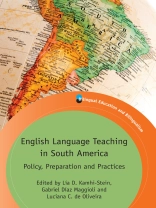This book investigates new English language policies and initiatives which have been introduced and implemented across Argentina, Brazil, Chile, Colombia, Ecuador, Uruguay and Venezuela. Chapters are organized around three themes. Chapters in the first section critically examine newly-implemented English language policies, as well as factors that contribute to and prevent the implementation of such policies. Chapters in the second section describe and analyze current teacher preparation and teacher development initiatives, in addition to the challenges and opportunities associated with such initiatives. Finally, the third section features school- and classroom-based research designed to investigate the status of English language teaching and the implementation of innovative programs. All authors have a first-hand understanding of the South American context and draw on references and resources which originate beyond Inner Circle countries. The book showcases examples of innovation and success in a variety of complex contexts and will serve as a starting point for researchers, as well as being of interest to students, policymakers and stakeholders.
This book is open access under a CC BY NC ND licence.
表中的内容
Contributors
Acknowledgements
Lía D. Kamhi-Stein, Gabriel Díaz-Maggioli and Luciana C. de Oliveira: Introduction
Section I. English Language Policy
1. Cristina Banfi: English Language Teaching Expansion in South America: Challenges and Opportunities
2. Gabriel Díaz-Maggioli: Ideologies and Discourses in the Standards for Language Teachers in South America: A Corpus-based Analysis
3. Claudia A. Brovetto: Language Policy and Language Practice in Uruguay: A Case of Innovation in English Language Teaching in Primary Schools
4. Adriana Maria Tenuta, Miriam Jorge and Ricardo Augusto de Souza: Language Teaching in the Brazilian Changing Scenario of Language Education Policies
Section 2. English Language Teacher Preparation and Professional Development
5. Natalie Kuhlman and Elisabeth Serrano: Teacher Educational Reform: The Case in Ecuador
6. Mary Jane Abrahams and Pablo Silva Ríos: What Happens with English in Chile? Challenges in Teacher Preparation
7. Patricia Veciño: Integrating Technology In Argentine Classrooms: The Case of a Buenos Aires Teacher Education School
Section 3. School-based Research and Innovative Practices
8. Rebecca Pozzi: Examining Teacher Perspectives on Language Policy in the City of Buenos Aires, Argentina
9. Carmen T. Chacón: Film as a Consciousness-Raising Tool in ELT
10. M. Inés Valsecchi, M. Celina Barbeito and M. Matilde Olivero: Students’ Beliefs about Learning English as a Foreign Language at Secondary Schools in Argentina
11. Danielle Almeida and Velúcia Guimarães de Souza: Towards a Multimodal Critical Approach to the Teaching of EFL in Brazil
12. Mónica Rodríguez-Bonces: Seeking Information to Promote Effective Curriculum Renewal in a Colombian School
Epilogue
Topic Index
Author Index
关于作者
Gabriel Díaz Maggioli is tenured Professor of TESOL Methods at the National Teacher Education College in Montevideo, Uruguay. He also acts as consultant in education-related projects for various organizations in the Americas, Europe, the Middle East and East Asia.












